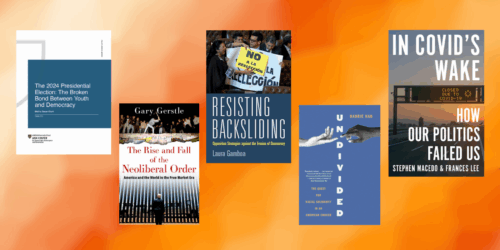
Podcast
Terms of Engagement – Episode One
From rank-choice voting to reconciliation, American democracy is headline news. Let’s talk about it.
Video
On April 3rd, panelists discussed if there is, in fact, a better way to elect the President of the United States.
Danielle Allen, James Bryant Conant University Professor, Harvard University; Director of the Allen Lab for Democracy Renovation, Harvard Kennedy School’s Ash Center for Democratic Governance and Innovation
George Edwards, Distinguished Fellow, University of Oxford; University Distinguished Professor of Political Science and Jordan Chair in Presidential Studies Emeritus, Texas A&M UniversityAlex Keyssar, Matthew W. Stirling, Jr. Professor of History
and Social Policy, Harvard Kennedy School
Moderated by Archon Fung, Innovation Winthrop Laflin McCormack Professor of Citizenship and Self-Government at Harvard Kennedy School; Director, Harvard Kennedy School’s Ash Center for Democratic Governance
Podcast
From rank-choice voting to reconciliation, American democracy is headline news. Let’s talk about it.
Commentary
In a warning to lawmakers, cybersecurity expert Bruce Schneier testified before the House Committee on Oversight and Government Reform, sharply criticizing the Department of Government Efficiency’s (DOGE) handling of federal data. Describing DOGE’s security protocols as dangerously inadequate, Schneier warned that the agency’s practices have put sensitive government and citizen information at risk of exploitation by foreign adversaries and criminal networks.
Feature
A collection of must-reads curated by Ash Center’s Reimagining Democracy team.
Podcast
From rank-choice voting to reconciliation, American democracy is headline news. Let’s talk about it.
Feature
On July 4, 2026, America will celebrate the 250th anniversary of the signing of the Declaration of Independence. As this milestone approaches, the team at the Allen Lab for Democracy Renovation has curated a collection of books, podcasts, and events that explore the meaning and impact of the declaration from 1776 to today. Join us in revisiting the document itself, reflecting on its legacy, and considering the ongoing struggle to uphold democratic ideals.
Feature
A collection of must-reads curated by Ash Center’s Reimagining Democracy team.


